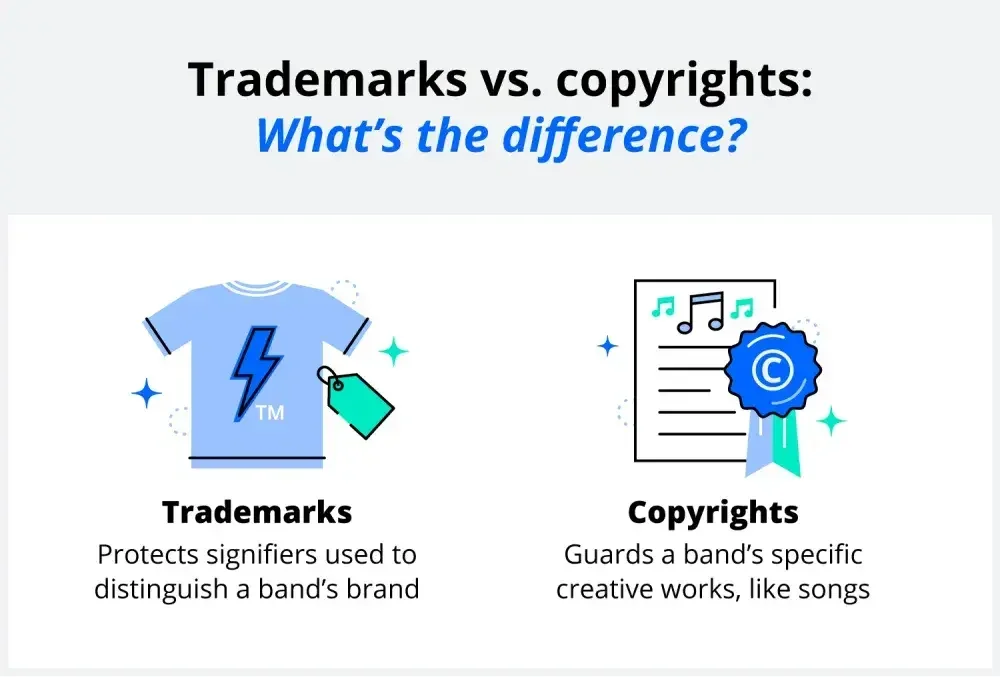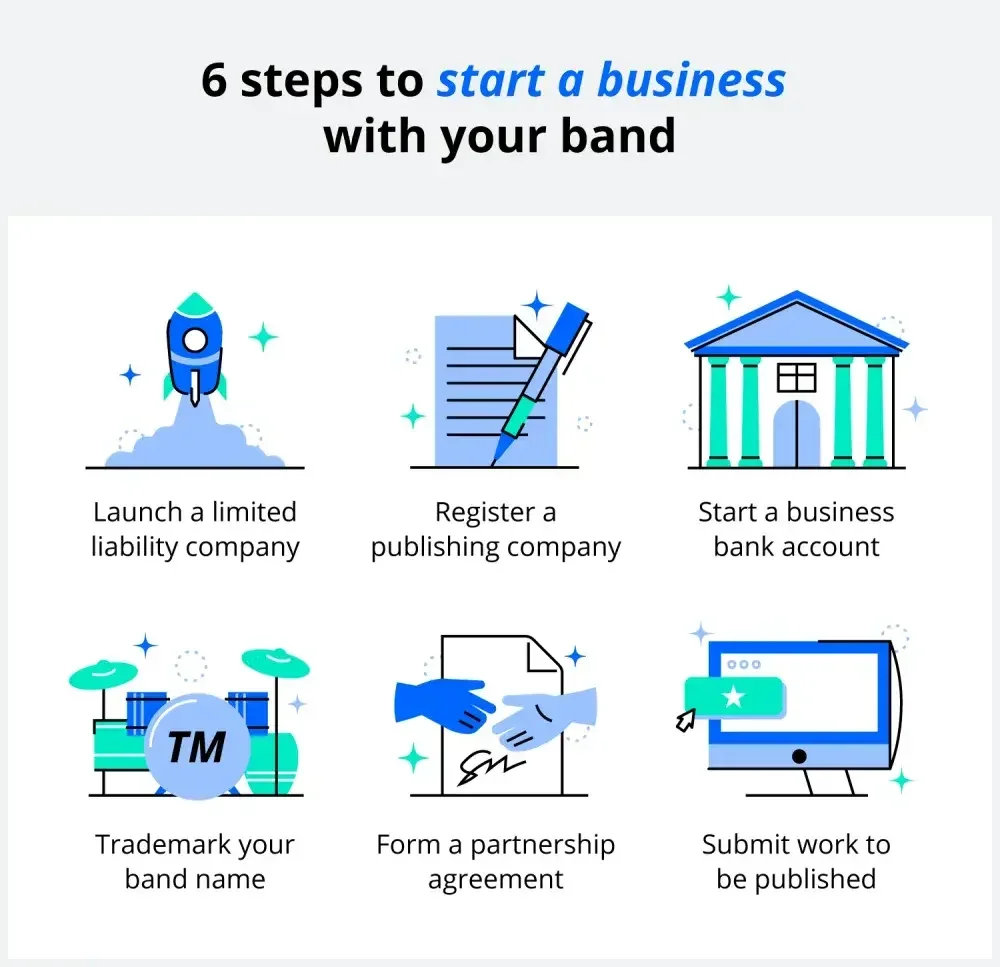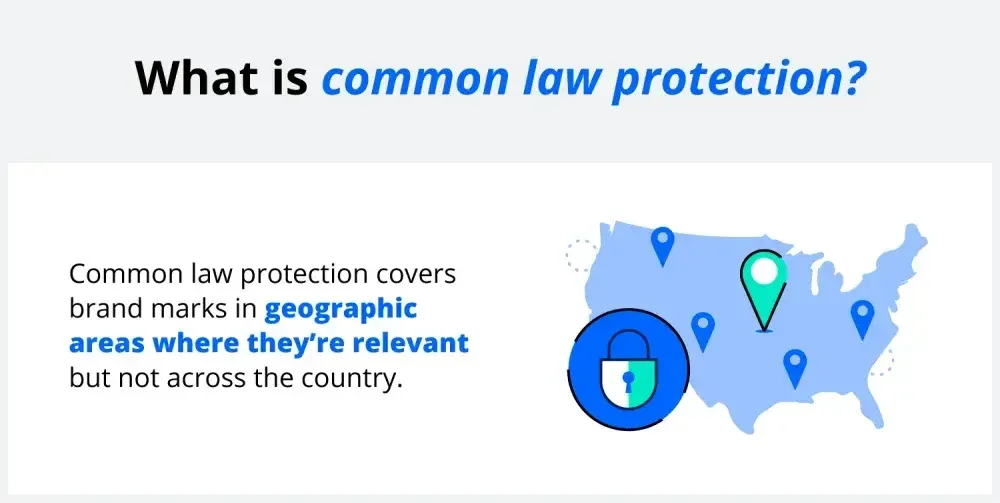When you start a band, the music is paramount, but you also have to consider intellectual property protection and business formation practices. Both are essential to any group's success in the modern music industry.
Most musicians are artists at heart, and it can be easy to ignore the formalities of business contracts and finances. But the sooner you decide to think of your band as a business, the more likely you are to avoid legal drama and money issues.
We'll cover how trademarks and copyrights apply to the music world, the legal aspects of the music business, and what you need to know to establish your band's brand.

Copyrights and trademarks: Why does a band need them?

It helps to understand the legal concepts of trademark and copyright law so that your band name and materials are protected from being used without your permission.
Copyright and trademark laws are two forms of intellectual property rights that allow owners and creators to protect their works from unauthorized use.
- Trademarks protect distinctive brand signifiers, such as words, names, symbols, sounds, and colors used in commerce to distinguish products and services by their company or brand. or example, The Rolling Stones have registered trademarks for both their band name and their famous lips and tongue logo.
- Copyrights protect specific creative works, such as a song or painting. The authors of a song hold a copyright to the musical composition. If your band records songs, it will have a separate copyright to the sound recording you created. You might also have a copyright to a music video. The copyright exists as soon as the author creates the song and memorializes it in some tangible way like sheet music or a recording. You gain additional rights, including the right to sue for copyright infringement, by registering your copyright with the U.S. Copyright office.
Especially if your band has promotional artwork or writes its own songs, you should be aware of how these protections work so you can guard your creations with a copyright or protect your band name with a trademark.
Turning your band into a business: 6 essential steps

All bands require a little behind-the-scenes effort to keep things running smoothly. A successful band must pay attention to the business aspects of music. Read on for six tips that can help your band start off in the right direction.
1. Launch an LLC
It may seem odd to form a limited liability company (LLC), but the purpose is to shield band members from liability.
A band could face liabilities in many ways, whether with venues, publishers, a booking agent, tour manager, or other bands. An LLC would shield you from being personally liable for these lawsuits if you lose one, meaning your personal assets would be off the table.
A corporation offers this same protection, but LLC's are much more flexible when it comes to ownership, management, decision making, taxes, and profit sharing.
If you don't create an LLC, your band will probably be treated as a general partnership and you and the other band members would each be fully liable for any of the band's debts or liabilities. You could even be personally liable for something another band member did without your knowledge.
Creating an LLC for your band is a simple process. You'll first check your state's business formation website (usually the Secretary of State's office) to make sure your band's name is available for use as a business name. If it's not available, you'll need to choose a new official business name and register the band's name as a DBA, or "doing business as" name.
You'll file a document with the state to officially create your company. You should also have an LLC operating agreement, which is essentially the same as a band partnership agreement, discussed below.
The LLC's owners will share the band's profits in the way you've described in your operating agreement. If you have musicians who perform with the band but aren't LLC owners, you'll have two choices for paying them:
- They can be employees of the LLC. If you have employees, you'll need to run payroll, withhold taxes, and pay half of your employees' payroll taxes. Employees need to fill out a W-4 to withhold taxes from their paychecks.
- They can be independent contractors. Independent contractors need to fill out a W-9 and pay their own taxes.
If you and your bandmates are close, you should chat with them about whether they prefer to be employees or contractors. More importantly, a business accountant can help you understand the difference between employees and independent contractors and choose the classification that's best for your situation. An accountant can also advise you on the tax aspects of running an LLC.
2. Register a publishing company
If you write songs, you might consider creating a publishing company. Even if you're a solo songwriter and not in a band, forming a publishing company can help protect your interests in your music's profitability.
Music royalties are a complex topic, but they stem from the fact that songwriters have a copyright to the music compositions they create. This copyright gives the songwriter the exclusive right to perform the musical work publicly, reproduce and distribute it, and create other works based on it. If anyone else wants to record the song, play it live at a music venue, or use it in another way, they must get a license from the copyright owner.
Fees for those licenses are paid in royalties. Songwriters are entitled to half the royalties for a given song, while half goes to the music publisher. To collect these royalties you have three options:
- Register your songs yourself with a performance rights organization such as BMI or ASCAP and receive the songwriter portion of the royalties directly. If you register songs on your own and you don't have a publishing company, you can't collect publishing royalties for your music.
- Form your own publishing company. This allows you to collect both songwriter and publisher royalties. It also means you'll be responsible for making sure royalties get paid.
- Work with an established publishing company. The company may handle the entire publishing process and keep all the royalties, or it may co-publish the work with your publishing company. The advantage to this is that publishing companies are industry professionals experienced in monitoring and collecting royalties. They may also market your songs to other artists, increasing your potential royalty income. But the publishing company will keep all or part of the publishing royalties.
The route you choose will depend on the stage you're at in your career, your willingness to deal with the administrative side of your music, and whether you need or want the kind of music promotion services an outside publishing company might provide.
If you do form a publishing company, your publishing company can be a sole proprietorship, which may only require filing a DBA application to get started.
3. Start a business bank account
Keeping track of your finances while managing your band is a lot of responsibility. Instead, launching an LLC bank account as a newly formed business can help you stay on top of your money.
A business bank account allows you to separate your business expenses from your personal ones. While this may seem minor, keeping business and personal finances separated is the key to preserving the limited liability that comes with an LLC.
A business bank account makes your life easier because you'll always know how much money the band has. And when tax season comes around, you'll create a headache for yourself if you have to comb through your bank statements to find old business transactions. A business bank account keeps everything organized in one place.
Opening a business bank account is a simple process. You'll first need to obtain a business tax ID number from the IRS website. Then you'll take the ID number and your LLC's certificate of formation to your bank.
4. Trademark your band name
With millions of bands creating music all over the world, there may come a time when another band tries to use your band's name. Another band with the same name can confuse your fans and make it harder to keep your audience engaged. A federal trademark comes into play to help your band stay distinctive.
Trademarks are registered through the U.S. Patent and Trademark Office (USPTO). Your band's name must be distinctive enough to qualify for trademark protection and not infringe on any trademarks that have already been registered for the same types of goods or services.
To be distinctive enough to trademark, your band's name can't just be generic or descriptive, like The Big Band. A name that can be trademarked might be a fanciful or made up name, like Aerosmith; or an arbitrary use of an otherwise common word, like The Doors; or a name that suggests something about your music without naming it specifically, like Radiohead.
Before you file a trademark application, make sure the name you've selected isn't already being used for the type of goods or services you want to protect. This and can be verified with a trademark search to see if a name is available. A trademark search combs the U.S. Patent and Trademark Office database, and may also encompass state business name databases to identify any unregistered marks that are in use.
The two primary types of marks that can be registered are:
- Trademarks: Identify goods. "Trademark" is also often used as a generic term to refer to marks that identify either goods or services.
- Service marks: Exclusively identify services

When you register a trademark, you must specify the type, or class, of goods or services you want your trademark to cover. For example, your band might seek trademark protection for both musical sound recordings and live music performance.
Unregistered trademarks and service marks provide what's called common law protection, a limited form of coverage that a registered trademark can trump. A registered trademark allows you to sue for trademark infringement and gives you additional tools to protect your mark internationally.
If you're interested in growing your band, registering your band name as a trademark will afford you more protection from copycats in the long run.
5. Form a partnership agreement
Keeping the group in sync and working in harmony isn't always easy—this is where a band partnership agreement comes in. If your band is an LLC, this agreement will be called an LLC operating agreement form instead of a partnership agreement.
Most bands have disagreements in their course of their life. A partnership agreement protects your music career by setting clear rules that will help you avoid expensive legal disputes down the road. A partnership agreement outlines provisions for operating your band with your bandmates, noting things like:
- How the band's expenses will be paid
- Whether the band or the individual songwriters own the copyright to your original music
- How you'll split publishing and songwriting income
- How you'll divide money from playing live gigs, tour income, and merchandising income
- Who owns the band's instruments
- Who owns the band name, and who can use the name if the band splits up
- Voting rights for members
- Who can sign contracts with venues, record labels, vendors, artists, and others on behalf of the band
- Processes for bringing in new members and dealing with members who leave the band
- Provisions for breaking up, including via buyouts
- Resolutions for disputes between members
6. Submit your work
When you have a creative work, such as a song or recording that you'd like to submit for possible use in a film, video or TV production, you may be asked to sign a submission release form, particularly if you're submitting the work yourself and not through an agent. This can even occur if you've created your own publishing company, such as in instances where your work is licensed for a marketing campaign.
Submission release forms are most commonly used with music or screenplays and are a waiver of rights to sue for issues like copyright infringement or breach of contract if the production company ends up using music that's similar or identical to yours. A submission release form also typically confirms that you have the copyright to the work and clearly states that the form is not an agreement by the production company to use the work you've submitted.
If you go the route of contacting a production company directly, it is almost certain they will ask you to sign a submission release form in exchange for reviewing your music. These forms are typically not negotiable. Other types of release forms common to musicians include:
- Music release forms: Grant either licensing rights to the song(s) or a complete transfer of the copyright to the music. You might be asked to sign a music release if your submission to a production company is accepted, or if you're contacted by someone who wants to use your music in a film or video production or a marketing campaign. These forms should specify the length of the license, how your work can be used, and how much you'll be paid.
- Print release forms: Grant rights to personal imagery, such as photography or paintings, that are used for artistic purposes
- Copyright release forms: Grant limited rights to commercial imagery used for promotional purposes
- Podcast release forms: Grant rights to record, use, and publish an interview containing your voice, ideas, thoughts, and opinions
If your work is protected by copyright, the submission release form usually states that you will be paid market value for the rights. Even so, remember that the release is neither a contract nor a promise to buy your work.
To have a successful career in the music industry, you need to be savvy about the music business. Whether you're hiring musicians, dealing with a record label or venue, or managing money, it pays to educate yourself. There are many online resources that focus on just that, such as the Berklee College of Music's online music business courses.
Protecting your rights as a musician can get complicated. If you're ever unsure about which steps to take to guard your work, limit your liability, and set yourself up for success, get professional help from a music business lawyer or an accountant. You can have an attorney draft a band partnership or LLC agreement, draft other contracts, and review your forms before signing any rights away to someone else.


